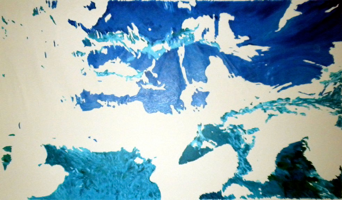Omphaloskepsis Blog
Creation {of Melancholy Fate} by Supreme Being
Dec 13, 2009

The sixth painting begun. The poem from which the title is derived is below. IŌĆÖm working on streamlining my process so that I can work quicker. To that end IŌĆÖm working a little more wet on wet, combining the techniques I learned about classical renaissance painting techniques with freestyle contemporary self-taught techniques. I keep wondering if somewhere down the line the two totally different types of paintings I do will begin to move closer together until one day they reconcile.
To View the progression: Painting Progression: Creation {of Melancholy Fate} by Supreme Being
Solitude┬Ā by Jorie Graham
The subject of mutability
Fog┬Ā┬Ā┬Ā hour┬Ā┬Ā┬Ā tree┬Ā┬Ā┬Ā (frogs)
(mourning dove/hiss of train uncoupling)
(inaudible component to operatic sunset)
The subject of mutability
Graduation that can be imagined
Graduation that cannot be imagined
(difference) ┬Ā┬Ā┬Ā (Series)
appearance out of nowhere of the new
life-history┬Ā┬Ā┬Ā Monstrous birth
Need that provokes satisfaction of that need.
Account for origin of [such and such]
Change┬Ā┬Ā┬Ā Undergone
Lust┬Ā┬Ā┬Ā Hunger┬Ā┬Ā┬Ā Danger
Cross-fertilize┬Ā┬Ā┬Ā Maintain vigor
┬Ā┬Ā┬Ā [protective]
of the significance┬Ā┬Ā┬Ā of the vestigial
presupposes┬Ā┬Ā┬Ā a former function
the power of acquiring new parts
attended by new propensities
directed by irritations sensations volitions associations
Editor: their possessing the power to continue [to improve?]
┬Ā┬Ā┬Ā by their own inherent activity,
delivering those improvements to posterityŌĆōŌĆō
Speaking subject: world with out end
Animal┬Ā┬Ā┬Ā ┬Ā┬Ā┬Ā Kingdom
Branching┬Ā┬Ā┬Ā ┬Ā┬Ā┬Ā Limbs
(The last branch the branch IŌĆÖm on)
(The final branching)
had not become extinct
had been transmuted into living
the supposed tendency to perfection
the supposed tendency to increased complexity
the supposed scale of being
the supposed bottom the supposed top
ed: allusion to another work
s.s: I do not hold before me the words
┬Ā┬Ā┬Ā I do not hold before me the words said and under
┬Ā┬Ā┬Ā stood?ed: perceiving subject speaking subject thinking subject?s.
s: I have to trace a path
┬Ā┬Ā┬Ā I am sinking into the local the temporal open,
┬Ā┬Ā┬Ā That other-than-me who is the I
ed: I said: the openness to the world such as we re-
┬Ā┬Ā┬Ā discover it in ourselves and the perception within life
┬Ā┬Ā┬Ā intertwine, encroach upon, change to one another?s.
s: consciousness seeking to see time and not to measure it?s.
s: consciousness that is at once spontaneous and reflected
┬Ā┬Ā┬Ā ┬Ā┬Ā┬Ā [on the same page]
┬Ā┬Ā┬Ā ┬Ā┬Ā┬Ā the look that kills?[my ŌĆ£lookŌĆØ]
┬Ā┬Ā┬Ā [the presence of what is behind my back]
┬Ā┬Ā┬Ā (self-presence which is not an absence from oneself)
┬Ā┬Ā┬Ā ┬Ā┬Ā┬Ā (the figure on the ground)
(it is already the flesh of things that speaks to us of our own
┬Ā┬Ā┬Ā flesh, and that speaks to us of the flesh of the other)
you must rise┬Ā┬Ā┬Ā ┬Ā┬Ā┬Ā ┬Ā┬Ā┬Ā it is said
by anomaly┬Ā┬Ā┬Ā deviation┬Ā┬Ā┬Ā branching
from what might have been
the environment interfered
the environment interferes
new needs because of inner feeling
internal┬Ā┬Ā┬Ā ┬Ā┬Ā┬Ā feeling?living┬Ā┬Ā┬Ā ┬Ā┬Ā┬Ā force
out of catastrophe blooms afresh
also extensive ┬Ā┬Ā┬Ā ┬Ā┬Ā┬Ā extinction
a new concept of love involving abandonment
creation (of melancholy fate) by supreme being
After catastrophe┬Ā┬Ā┬Ā advance in the complexity
┬Ā┬Ā┬Ā of superiority┬Ā┬Ā┬Ā ┬Ā┬Ā┬Ā of purpose
of the effects┬Ā┬Ā┬Ā ┬Ā┬Ā┬Ā of internal sentiment
of the effects of acts of obliteration
look back┬Ā┬Ā┬Ā ┬Ā┬Ā┬Ā become
[not magnification]┬Ā┬Ā┬Ā [but change]
reformation┬Ā┬Ā┬Ā ┬Ā┬Ā┬Ā realization
a partaken away
no whole??the idea of development enters the world
Such is the machinery of perfection: loss
Such is the machinery of history: habit
Such is the sacred theology: history
Trace continuity through recapitulation
Not magnification, but change
The eye is adapted to the medium in which
it lives: agency, wisdom, progression, anticipation.
So the idea of development enters into
the world.
s.s: Let us therefore consider ourselves installed
among the multitude of things. Let us try to form notions
that would enable us to comprehend what happens
to us there. Our first truthŌĆōŌĆōwhich prejudges
nothing and cannot be contestedŌĆōŌĆōwill be that ?there is
ed: one is tempted to say, ŌĆ£the thingsŌĆØ ŌĆōŌĆō
s.s: presence, that ŌĆ£somethingŌĆØ is there, and that ŌĆ£someoneŌĆØ
is there. Before coming to the ŌĆ£someone,ŌĆØ let us ask first
ed: one is tempted to say ŌĆ£the thingsŌĆØŌĆ”
s.s: what the ŌĆ£somethingŌĆØ is.
ed: understood by that?
 MENU
MENU